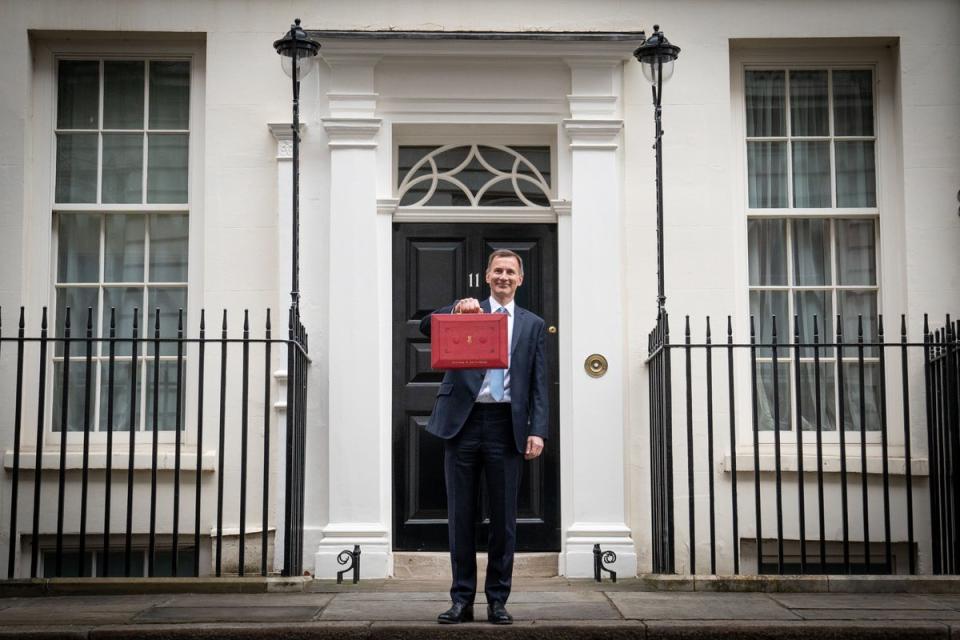What else could be in the Budget as National Insurance cut expected
- Oops!Something went wrong.Please try again later.
Jeremy Hunt will deliver his Budget on Wednesday and set out the government’s spending plans.
In the run-up to the Budget, most reporting had focused on whether the chancellor would cut taxes - either income tax or National Insurance Contributions (NICs) - when he delivers his statement from the dispatch box on Wednesday afternoon.
But in a boost for workers, it was confirmed on Tuesday the chancellor is expected to slice 2p from the rate of National Insurance after concluding income tax cuts would be too expensive and risk stoking inflation, which remained frozen at 4 per cent in January.
Here, The Independent takes a look at what else is expected to be announced by the government and what is likely to feature in Wednesday’s Budget.
‘Public sector productivity drive’
Over the weekend the government announced an £800 million funding package for technology to help drive “efficiencies” in the public sector.
The Treasury said the money would be used to pay for drones and AI to free up the time of police and NHS workers to help tackle crime and reduce waiting times.
The chancellor said the investment would provide up to £1.8 billion worth of benefits by 2029.
Research and development

On Sunday the Treasury said the chancellor would outline a “significant” investment package in the UK’s life science and manufacturing sectors.
Officials said the package would be worth £360 million and form part of the “government’s plan to grow the economy, boost health resilience and support jobs across the UK”.
“The funding will go towards several companies and projects who are making cutting edge technology in sectors key to economic growth and part of wider government support to ensure the UK is the best place to start, grow and invest in manufacturing,” a Treasury statement said.
Pension fund reforms
On Saturday the chancellor announced pension fund reforms as a further step in the government’s plan to “boost British business and increase returns for savers”.
The Treasury said this would include requirements for Defined Contribution (DC) pension funds to publicly disclosure their level of investment in the UK.
The government said its auto-enrolment rollout has driven a huge growth in the amount of investment entering UK pension funds, from less than £90 billion in 2012 to around £116 billion in 2022.

“However, the disclosure requirements for DC pension funds are currently inconsistent across the market and do not require a breakdown of UK investments, sometimes making it difficult for policymakers and savers to understand where this money is invested,” a statement said.
“By ensuring pension funds publicly disclose where they invest and the returns they offer, it will make it possible for employers and savers to compare schemes and make informed choices.”
Earlier this year Mr Hunt confirmed that he was keeping the triple lock on pensions, meaning pensions will increase by 8.5 per cent from April.
Pensioners generally receive an increase in line with rising prices (inflation), average earnings growth of 2.5 per cent, whichever is highest.
Why did the chancellor not cut income tax as well as NICs?
Downbeat economic forecasts meant the chancellor had less money to spend than he had hoped for.
The two main options considered by Mr Hunt and Rishi Sunak, the prime minister, were cuts to NICs or income taxes, to be funded through tax rises in other areas of public spending cuts after the chancellor ruled out borrowing money for giveaways, saying doing so would be “un-conservative”.
The Treasury says the 2p cut to NICs will cost it around £10 billion - cutting 2p from income tax would cost around £14 billion.
According to The Sunday Times, an Office for Budget Responsibility forecast given to Mr Hunt on Friday showed he had £12.5 billion of spending headroom for his Budget.
But he needed to set £6 billion of that aside for a ‘rainy day’ to guard against any further deterioration in the public finances, with the economy in a shallow recession and growth weak.

